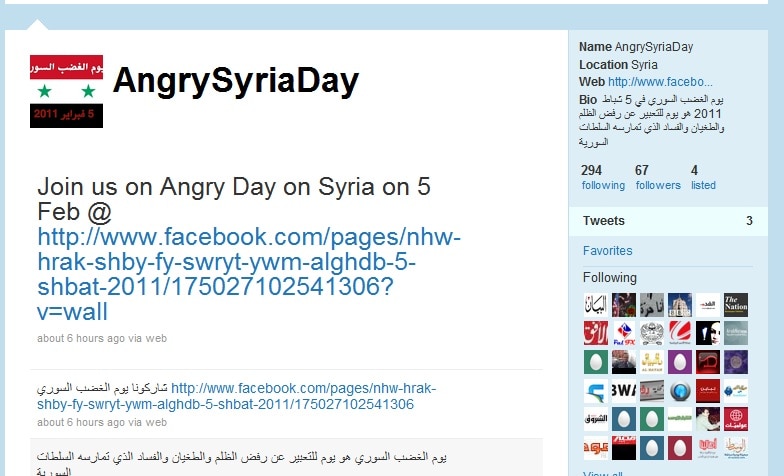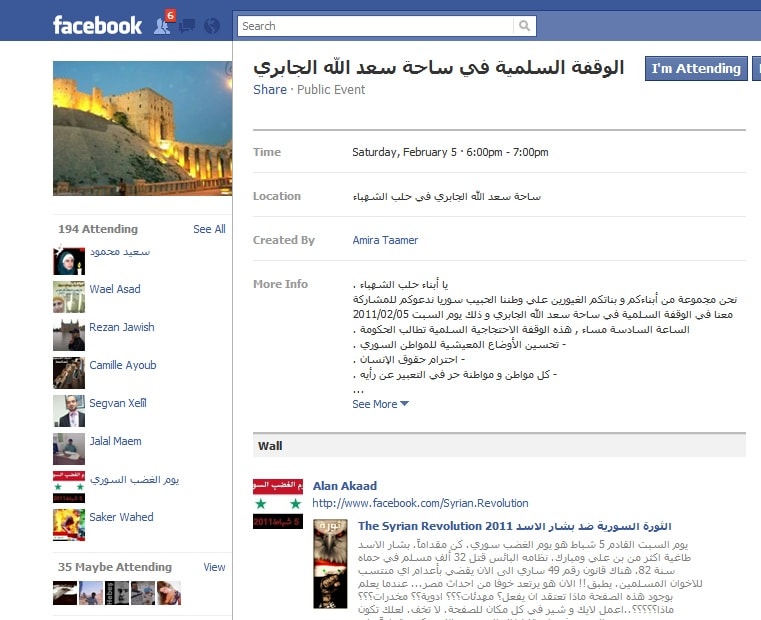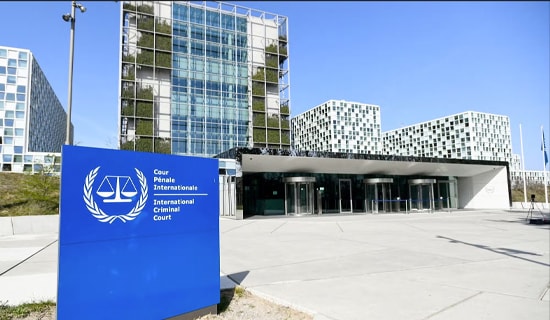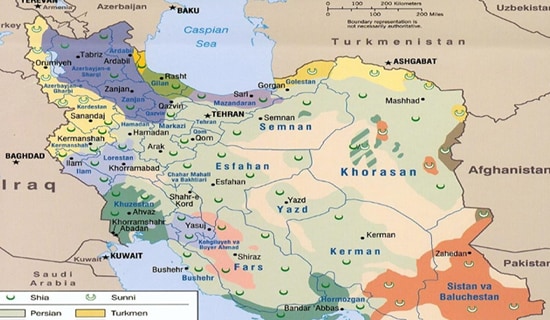Introduction
In the past week, Syrian activists have been using Facebook to call for mass protests in Syria on Saturday, February 5, 2011, dubbing it the "Day of Rage." In Facebook pages created specifically for this purpose, members have called on the Syrian public to take to the streets on that date and stage peaceful demonstrations and rallies in all parts of the country, as well as in front of Syrian embassies in Arab and European capitals, in protest of the oppressive Syrian regime. These Facebook pages also feature images and videos slamming Syrian President Bashar Al-Assad and supporting protest against his rule.
The organizers of the Syrian protests have expressed support for the demonstrators in Tunisia and Egypt, and have adopted their methods:[1] opening special Facebook pages on which information is posted regarding the place and time of the planned protests, and creating a special profile picture, associated with the protests, to be used by all Facebook members sympathizing with the cause. However, it seems that the scope of their activity is limited compared to that of the Tunisian and Egyptian activists. So far, the number of people who have registered as members on these Facebook pages is relatively small, and some of the members reside outside the country.
Among those promoting the "Day of Rage" protests is the Independent Islamic Bloc – part of the "Damascus Declaration" opposition movement – which has called upon Syrians to attend a "sweeping protest and mass rally" in front of the Parliament house in Damascus on February 5. In its announcement, the organization praised the protests in Tunisia and Egypt and warned the Syrian regime against continuing its oppression, corruption and political arrests.[2] Websites have also published a message by "the Popular Committees in Aleppo Province" announcing a February 5 protest rally in the center of Aleppo, the second largest city in Syria.[3]
The organizers of the planned demonstrations in Damascus and Aleppo have listed their demands: an improvement in living standards, respect for human rights, freedom of speech for all Syrian citizens, and greater influence for Syrian youth. They requested that the protesters come equipped with nothing more than Syrian flags and signs expressing their demands.[4]
Syria is on the alert for the possible spread of protests to its territory. On January 29, 2011, the Syrian authorities prevented the holding of a demonstration in solidarity with the Egyptian protesters in front of the Egyptian embassy in Damascus, fearing a conflagration.[5] It was also reported that Syrian security chief 'Ali Mamlouk has met with province governors and police commanders in order to prepare for possible protests in the country.[6]
There are conflicting reports regarding the accessibility of Facebook, which has played a crucial role in mobilizing the public for the current wave of protests in the Arab world. According to a January 25, 2011 report on Alarabiya.net, the Syrian authorities have restricted access to Facebook in a bid to keep the protests from spreading to Syria, but some users are managing to access the site through proxies. [7] The Syrian news agency SANA has denied this, saying that access to the Internet is unrestricted throughout the country.[8]
Following is a review of the preparations on Facebook for the February 5 protests in Syria:
Facebook Pages Created to Advertise February 5 Protests
In advance of the anticipated events, several Facebook pages have been launched, such as the pages titled "Syrian Day of Rage," "The Syrian Revolution against Bashar Al-Assad," and "Towards Popular Action in Syria: The February 5, 2011 Day of Rage." As of this writing, these three pages have some 5,000 registered members, but more are joining every hour.
Facebook page launched in advance of the protests, with 1,500 members
http://www.facebook.com/pages/ywm-alghdb-alswry/147151028676674?ref=nf
The "Popular Action" page, with 1,000 members
http://www.facebook.com/pages/nhw-hrak-shby-fy-swryt-ywm-alghdb-5-shbat-2011/175027102541306
Page titled "Syrian Revolution against Bashar Al-Assad"
http://www.facebook.com/note.php?note_id=136763013004194#!/Syrian.Revolution
Calls to join the "Day of Rage" Facebook groups and participate in the protests were also spread via Twitter:
Twitter account dedicated to Syrian Day of Rage:
http://twitter.com/AngrySyriaDay
Special Facebook pages have also been created for users to confirm their participation in the protests. For example, a page titled "Syrian Day of Rage – Popular Action in Syria," calling for demonstrations in Syria and abroad, includes 127 confirmations, and a page advertising a planned demonstration in Sa'd Allah Al-Jabiri Square in Aleppo has 194 confirmations.
"Popular Action" page, with 127 confirmations
http://www.facebook.com/event.php?eid=175308452510885#!/event.php?eid=149985825055327
Page dedicated to demonstration in Aleppo, with 194 confirmations
http://www.facebook.com/pages/dd-wqft-5-shbat-w-dd-ywm-alghdb-alswry-w-swrya-allh-hamyha/160085677377630#!/event.php?eid=175308452510885
Communiqué Circulated on Facebook: The Day of Rage – an Apolitical Protest to Transform Our Bitter Situation
A communiqué posted on various Facebook pages and websites, titled "Syrian Day of Rage on February 5, 2011," stated: "The protests staged by the other Arab peoples were not motivated by a will greater than our own or [enabled by] capabilities greater [than our own]. The regimes [in Egypt and Tunisia] are no less cruel and violent than the regime in our country, but the [Egyptian and Tunisian] people raised the banner of liberty and honor, and stuck to their course. The Syrian Day of Rage is a national call that has nothing to do with any particular political bloc or stream. It [expresses] the will of the people, which aspires to freedom and wishes to rise up against its bitter situation and transform the poor economic situation that is deteriorating from day to day." The Facebook pages called to spread the communiqué on as many sites and platforms as possible.
The communiqué
http://www.facebook.com/pages/ywm-alghdb-alswry/147151028676674
Ad calling for demonstrations: "On Saturday, February 5, [Protest] throughout Syria, in every street, against oppression and corruption"
http://www.facebook.com/pages/ywm-alghdb-alswry/147151028676674?ref=nf#!/photo.php?fbid=147362948655482&set=a.147230262002084.27852.147151028676674
Day of Rage Profile Picture
As in previous protest campaigns, many Facebook users adopted the special profile picture designed for the occasion, consisting of the Syrian flag and the legend "Syrian Day of Rage – February 5, 2011."
"Day of Rage" profile picture
http://www.facebook.com/pages/ywm-alghdb-alswry/147151028676674?ref=nf#!/photo.php?fbid=147230265335417&set=a.147230262002084.27852.147151028676674
Numerous members use the special profile picture:
Anti-Assad Images on Syrian Facebook Pages
The Syrian Facebook pages also featured anti-Bashar Assad images, such as the one below, showing the Syrian president sharing the fate as Saddam Hussein.
The caption beneath the image says "very soon"
http://www.facebook.com/event.php?eid=175308452510885#!/photo.php?fbid=1821234888256&set=o.420796315726
A similar picture featuring Mubarak appeared on an Egyptian Facebook page.

http://www.facebook.com/ElShaheeed?ref=mf
Images from "Syrian Day of Rage" page:
Syrian Counter-Campaign in Support of Regime
Naturally, Facebook pages were also created in support of the Syrian regime and opposing the February 5 protests.
Page titled "Against the February 5 Rage Day Rally – Allah Is the Protector of Syria"
http://www.facebook.com/pages/dd-wqft-5-shbat-w-dd-ywm-alghdb-alswry-w-swrya-allh-hamyha/160085677377630
Page devoted to organizing a march in support of Assad on February 15
http://www.facebook.com/pages/msyrt-mhbt-lqayd-alwtn-wlswrya-alhbybt-fy-15-shbat/126060727462044?v=wall#!/pages/msyrt-mhbt-lqayd-alwtn-wlswrya-alhbybt-fy-15-shbat/126060727462044?v=wall
Y. Yehoshua is Director of Research at MEMRI.
[1] See also MEMRI Special Dispatch No. 3521, "Arab and Iranian Reactions to the Tunisia Uprising," Arab and Iranian Reactions to the Tunisia Uprising; and MEMRI Inquiry & Analysis No. 659, "Social Networks Harnessed by Protest Movement in Egypt," The Middle East Crisis Part II - Social Networks Harnessed by Protest Movement in Egypt .
[2] Syriahr.com, January 27, 2011.
[3] Elaph.com, January 28, 2011.
[5] Syriahr.com, January 30, 2011.
[6] Sooryoon.net, January 29, 2011.
[7] Alarabiya.net, January 27, 2011.
[8] Sana.sy, January 29, 2011.









